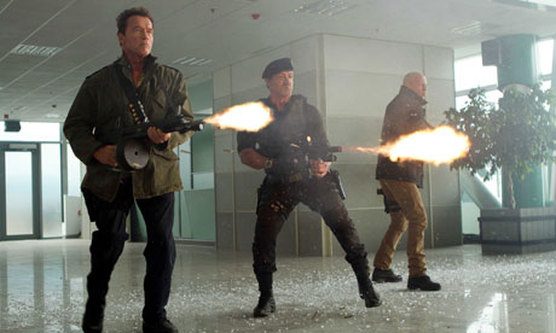 The Expendables are back, this time hunting down a rogue group of mercenaries intent on selling five tons of plutonium, found in an old Soviet mine, to the highest bitter. This time around directed by Simon West, the Expendables 2 is exactly what one would expect and hope for. Its big, loud, dumb, violent, self aware and really just a lot of fun. More so than the first go around, Expendables 2 really revels in it's iconic old action stars, with lots of nice winks at the audience, some even of a surprisingly subtle nature. Although not major characters, with Expendables 2 we get to see Stallone, Willis, and Schwarzenegger sharing the same action landscape, digging in and roughing up the bad guys. The only times the film struggles is when it gets a little too involved in sentimentality often coming off more laughable than sincere. Personally I did like how the film explores the pessimistic nature that these characters inhabitant - given there line of work, they are truly loners who have no time for love or relationships outside of the ones through fire and violence. It is also worth mentioning that Van Damme made strong villain, clearly having fun with the character though I wish he could have been even more flamboyant. Chances are if you wanted to see The Expendables 2 and/or enjoyed the first one you know what to expect, and the film delivers. 6/10
0 Comments
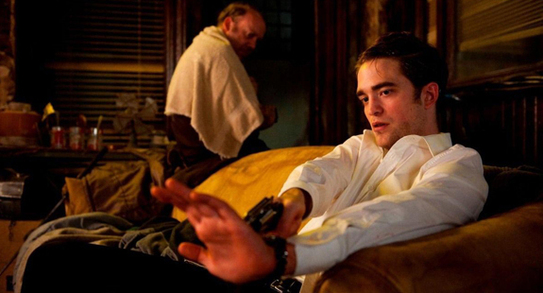 Taking place in the not-too-distant future, David Cronenberg's Cosmopolis tells the story of Eric Packer, a young successful financial guru who is king of the world. Almost the entire film follows Eric as he is chauffeured through Manhattan, watching the world crumble around him, as he slowly begins to lose his fortune due to a financial collapse. Cosmopolis is a provacative, complex experienced that is full of ideas, albeit a little muddled at times. Eric Packer's stone cold persona is particularly intoxicating - his lack of emotion and feeling towards the outside world effectively personifies how many feel about the upper class. For most of the film I was engrossed by the dreamy landscape which Cronenberg's direction and visual design created, though I felt disconnected or disjointed from the film much like Eric Packer is from humanity. All that changes during the last third of the film when Packer is confronted by Paul Giammattic's character, a poor, disenchanted soul intent on assassinating Packer. The exchange between the two is a beautiful analogy for the Class struggle in Capitalism, showing the inability in both the rich and poor have in understanding one and others intentions or motivations. We see the contradictions in both the rich and poor philosophies. Packer lacks sympathy, feeling or understanding while Giammati's character simply blames everyone but himself for his own failings. Ultimately the film makes an argument that both are needed to create balance in the world, showing how these outliers are a necessary component of society. Cosmopolis is a strange, dreamy experience that is confusing, stimulating and quite funny. Although it is oddly paced and tonally flat at times, it is still well worth being seen. 7.75/10 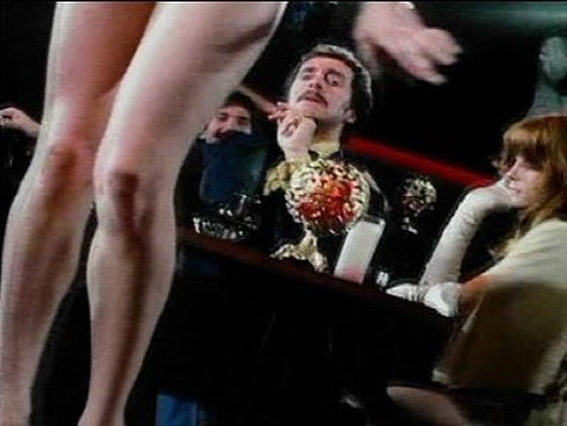 A masked psychopath is loose on the streets -stalking, torturing, and ultimately murdering his victims, who all happen to be Strippers. As the horrific murders increase, a ditsy reporter hires a private investigator to help solve the mystery behind these grisly murders. Herschell Gordon Lewis' The Gore Gore Girls is an extremely low budget sleaze-fest that is a lot of fun due to its willingness to embrace the type of film it is. Using a self-aware, comical soundtrack the film understands what it is, completely embracing its low-budget, campy style. The acting and plot of the film are nominal, as they just kinda exist for the sole purpose of stringing the murders together in a sensible way. The film lives up to its name with some absurd murder sequences that are both extremely gory, yet very creative. To give one an example of what you can expect, the murders range from a simple throat slitting to one poor girl getting her face deep fried. Given all this, it's not surprising in the least that this film received the X rating upon its release. While the plot is almost inconsequential, a major reason why this film works lies in the performance of Frank Kress as the private detective. He is so charmingly sleazy in such a playful way that he brings a nuanced sense of tongue and cheek humor to the whole film. The Gore Gore Girls is close to a masterpiece of trashy, low-budget cinema - if that is something one enjoys, there is no reason to believe they won't find The Gore Gore Girls to be a ton of fun. 7.25/10 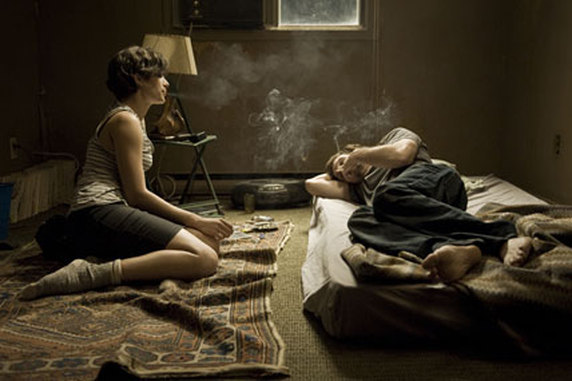 The opening scene of Anne Emond's 'Night #1' is shot in slow-motion at a rave. The camera slowly moves through sweat soaked masses, capturing this weird type of peace which is felt, particularly by Clara. Clara meets a stranger in Nikolai, as they quickly go back to his apartment for a passionate, drug induced one night stand. After the initial sex, something strange happens in that the two individuals find themselves exchanging their most inner feelings and fears to one and other in a night that could change both of them forever. Night #1 is a dialogue driven piece of filmmaking which examines two incredibly damaged individuals. At a glimpse, society would deem these individuals as unmotivated, useless indivduals, yet they are simply damaged individuals, who for different reasons, are lost in the abyss of life simply looking for some form of connection. Both Clara and Nikolai are missing any real form of emotional connection, instead opting to drown their sorrows in alcohol, sex and self-loathing. The strength of the film is these two characters, who are incredibly well fleshed out and feel very real. Through some superbly crafted dialogue we learn lots of great insights about these individuals and begin to understand them in a way which would not be possible by appearance alone. The dialogue is very intellectual at first, speaking to the physical vs emotional relationships people form, yet by the end it becomes just as emotionally gripping as it is intellectually interesting. Night #1 is a very simple film, taking place entirely in one apartment on one give night, but it is a fascinating character piece which is really elevated by its nuances and script. 8.25/10 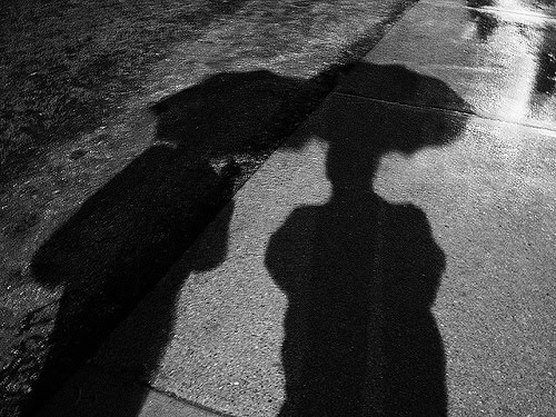 Mickey One stars Warren Beatty as a nightclub comic who is forced to live his life on the run after getting involved with the Mob. He flees Detroit for Chicago, taking the name 'Mickey One', but when he starts to see his star rise, his paranoia and fear of the mob finding him escalates, leading him to live in a constant state of panic. Arthur Penn's early film, Mickey One, is an interesting film which channels a lot of techniques from the French New Wave. The film is very artistically shot and designed, featuring some great montages and scenes throughout. Although Mickey seems unsure as to why the mob is after him in the first place, the film plays more like a chase film in the early part of the film. Things become especially interetsing once Mickey meets his love interest in Jenny (Alexandra Stewart), a woman which he slowly begins to fall in love with. Through this relationship with Jenny, the audience is able to see deeply into Mickey's soul and relate to his fear and anxiety about not only for his own life, but the well-being of Jenny. The paranoia which begins to consume Mickey is particularly affective, using some rather haunting and expressionistic lighting and imagery to really capture the fear and anxiety which slowly consuming Mickey. The spotlight sequence, where Mickey feels trapped and alone while being on stage is really the highlight of the film, capturing an almost unbearable amount of tension and unease. In fact, the film has quite a few memorable montage sequences from the opening sequence to the principal sequence which captures Mickey and Jenny falling in love. A very unconventional Hollywood film from the time, Mickey One is an underappreciated film that definitely deserves to be mentioned as one of Arthur Penn's best films. 8.75/10 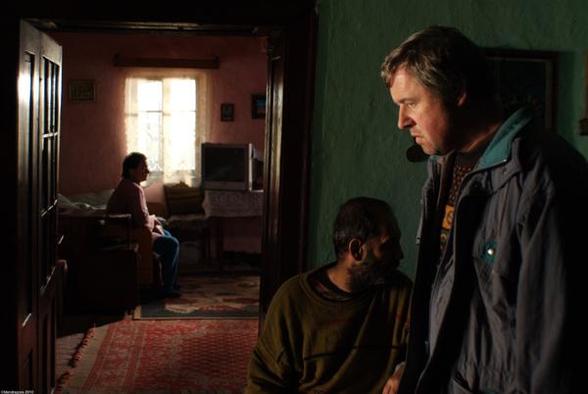 Nelu, lives a simple life with his wife in Salonta, a small town on the Romania-Hungary border. Nelu is a quiet man, working as a security guard at a local supermarket for money. Stressed by repairs which need to be done to the roof of his home, which his wife constantly reminds him about, Nelu's one place of solace is his fishing escapades in the mornings. One morning while fishing, Nelu finds a Turkish man attempting to cross the border. Not able to communicate to each other, the two men begin to understand each other, striking up an unlikely relationship between the two men. Marian Crisan's Morgen is a very simple story about one mans decision to do what is right. Facing opposition from his wife and friends around town, Nelu becomes more and more determined to help this man find his way to his family Very simplistic in its photography, the film is very naturalistic showing the day to day, slice of Romanian life. The one exception being how the cinematography captures this Turkish man in a handheld, shaky camera, capturing the uncertainty and chaotic nature of this man being somewhere he doesn't understand. While compelling on subject matter alone, the film never grabs the viewer much emotionally, creating a good warning to the viewer about never taking freedom for granted, but ultimately failing to achieve as much emotional impact as it could have. 6.75/10 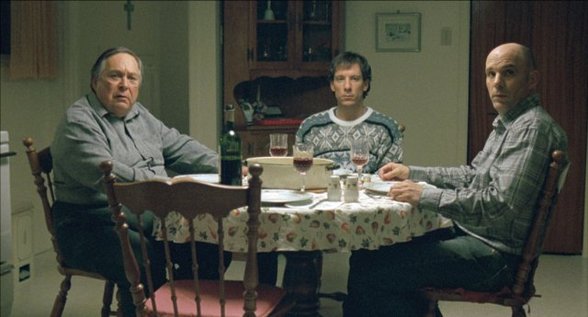 Familiar Ground centers around Maryse, a woman who lives a mundane existence with her husband, and Benoit, her brother, an immature man who appears stuck in adolescence. The two of them live separate lives, not seeming to get along with one and other until a group of strange coincidences, including the arrival of a man who claims to be from the near future, send them both on a road-trip of self-discovery and revelation which changes the two of them forever. Stephane Lafleur's Familiar Ground is an incredibly understated piece of filmmaking that uses a very minimalistic style to show the magic and wonder of life. The films ability to see the magic in the ordinary of everyday life is particularly interesting considering how well the film captures the stagnant, mundane existence which Maryse and Benoit feel. The film uses small details like extreme close-ups and well constructed compositions to capture this mood and emotion of its two main characters through visual means as opposed to dialogue, showing how the two of them really have more in common then they think. Some could find the film slightly off-putting as it wastes no time explaining the characters, instead opting to throw the viewer right into the story, having them pick up the details of the character's relationships - past, present, and future. The relationship and understanding of each other that unfolds between the two characters is both genuine and interesting, making for a resonant tale. While the film is nothing groundbreaking from an intellectual perspective, it managers to show the magic, beauty and bindings of everyday life in a nice quirky quality that never falls victim to the all too common cliches of the genre. 8/10 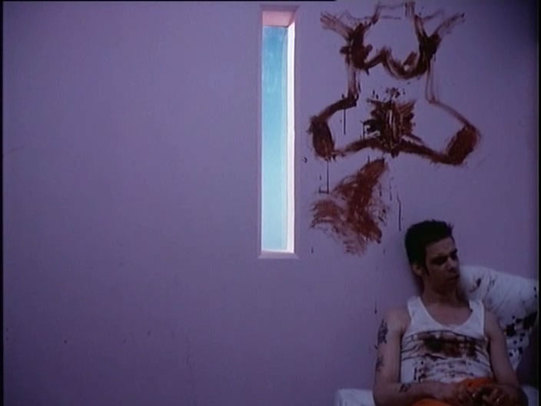 A high-tech maximum security prison in the middle of the Austrialian outback holds only the most violent and psychotic monsters. The facility is a very repressive place, with the cruelty towards the prisoners even coming into question. These cruel, unnecessary acts against the prisoners grow harsher and harsher as the months pass eventually causing a rebellion among the prisoners leading to horrific violence. John Hillcoat's first feature Ghosts...of the Civil Dead, examines the idea of how cruelty besets cruelty, and typically escalation more so than anything. It's a study of circular violence and the darkness of men. The prison in the film is really the main character. There are lots of various characters which the narrative encompasses, but the backbone of the story is the thematic impending doom from escalating tension which takes place - leading to a horrifically violent conclusion. This has got to be one of the best feature film debuts, with Hillcoat showing striking command over his vision, giving the film a documentary sort of feel. As each month passes, we are updated, with text, as to the latest violence that as happened, showing how this is a force of nature that will not simply go away in time. Narration is used throughout, explaining how this place is hell on earth and giving insights into the situation from multiple characters' viewpoints. The film is not biased at all as it splits its time between the prisoners and guards, showing the behind the scenes of these desperate worlds, as both of which feel imprisoned in this hellish place. As you can probably tell from now, Ghosts...of the Civil Dead is extremely bleak and atmospheric, with visual design adding to the tension of it all. Nick Cave is a highlight of the film, as one of the more psychotic inmates, giving a incredibly creepy, unchained performance, showing no fear of anything or anyone. John Hillcoat's feature debut is a startling film which is like no other prison film before it. 9.5/10 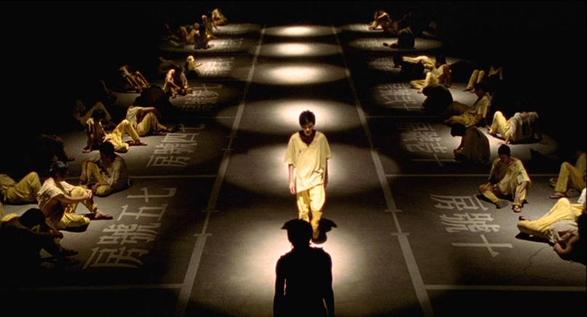 In an unknown futuristic world, Takashi Miike's Big Bang Love takes place at a juvenile detention center. A young boy, who is being contained at the facility, confesses to the murder of another, setting off a chain of events. The film follows two detectives who try desperately to uncover the truth behind the case. Big Bang Love is a film that is decisive in it's decision to focus much more on stylistic story-telling than narrative. The plot is really consequential to the bigger themes of the film, touching on homosexual tension and violence which drive the narrative, or semblance of one, forward. It is a film that questions the motives of men in our world and the reason for such violence which seems to plague all of mankind. Miike's Big Bang Love is a visually fascinating expressionistic nightmare of a film, with some breathtaking visuals that are both strange and poignant, at times. The film touches on many philosophical issues like the identity of masculinity in out society, homosexuality, violence, heaven and hell, and even the notion of how we are all related to space and time. This is definitely a film that is more about the experience than anything, being very vivid, but as one can probably imagine it is far too overstuffed with ideas, to the point that I had trouble even remembering everything the film was attempting to say. The main problem I had with this approach is that most of these themes or issues which the film chooses to explore, are not nearly fleshed out enough, making the analysis somewhat incomplete or just not as deep as i was hoping. Quite frankly, The imagery alone warrants a viewing, but this is a film that fails to reach its lofty goals. 6.5/10 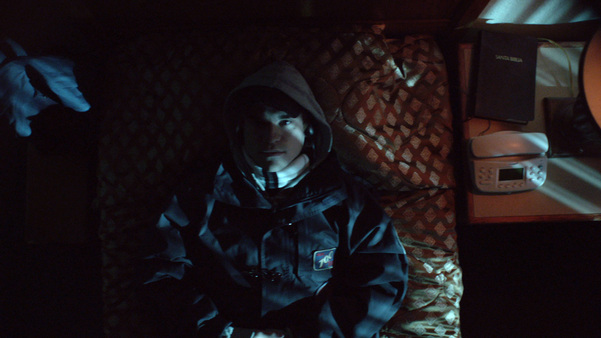 Based on a true story, Bart Layton's The Imposter, tells the story of Nicholas, a 13 year old, who went missing one night in San Antonio, Texas. Three and a half years later, he is found alive in Spain, with a story of how he was kidnapped, raped and tortured. His family is relieved to have him back, yet something is very strange about Nicholas. He speaks in a foreign accent, and doesn't look at all like he did 3 years ago. The Imposter is an unbelievable story about how one families deep felt grief, blinded them from the truth in front of them. While the story is incredible what sets this film apart from so many 'talking head" documentaries like it is it's cinematography. The Imposter uses poetic, beautiful imagery along with the chatter to create a mysterious, brooding, atmospheric mystery in which the emotional poignancy is just as strong as the mystery. Meticulously detailed, the film shows the story from perspective of every angle, including the family of the missing boy, the imposter himself, and the government officials just trying to put the pieces together. It's amazing how many little things had to go right for all of this to take place, with the film laying out all the details beautifully. It is fascinating to see how this families jubilation clouded their judgement as they blindly accepted this stranger as their son/brother/nephew. Towards the end, the film even manipulates the viewer, making you question the truth behind Nicholas' disappearance, much like the imposter did in this story. A great documentary that is guaranteed to keep you on the edge of your seat. 9/10 |
AuthorLove of all things cinema brought me here. Archives
June 2023
|
 RSS Feed
RSS Feed
